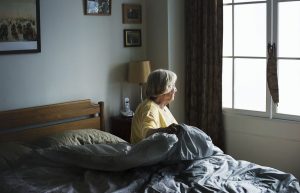Should Assisted Living Facilities House Advanced Dementia Patients?
Two inescapable facts control this discussion.
- Americans are living longer, and therefore suffer from unprecedented rates of dementia.
- Assisted Living Facilities are rapidly expanding their services provided, including developing ‘memory care’ or ‘dementia care’ units.
Although these two facts seem complimentary in theory, practically, they are not. As assisted living facility negligence lawyers, we regularly see grossly unequipped ALF’s keeping dementia residents that they cannot care for. The end result is often falls, wrongful death or serious injury.
If your family member suffered a serious injury or death in an assisted living memory care unit, call our compassionate ALF negligence attorneys at 1-844-253-8919 for a free case consultation. Our lawyers hire experts who can determine whether your loved one was an appropriate candidate for the ALF.
The Assisted Living Memory Care Dementia Fallacy
Assisted living facilities are undergoing a ‘re-brand’ in order to house more high acuity residents. Marketing under the idea of aging in place, assisted living facilities are referring to themselves as ‘memory care’ facilities. Many of these ALF’s hold themselves out to be experts in caring and supervising residents suffering with dementia or Alzheimer’s Disease. However, this is not the patient population that assisted living facilities were intended to serve.
“Assisted living facilities were originally designed for people who were largely independent but required help bathing, eating or with other daily tasks. Unlike nursing homes, the facilities generally do not provide skilled medical care or therapy, and stays are not paid for by Medicare or Medicaid. . . Dementia care is the fastest-growing segment of assisted living. As these residences market themselves to people with Alzheimer’s and other types of dementia, facilities across the country are straining to deliver on their promises of security and attentive care.” – NBC News
Assisted Living Injuries with Dementia Patients – A Legal Loophole?
 Because the ALF industry sees most of its new market share in dementia wings, the marketing of memory care services will only increase. However, when something terrible happens in an ALF memory care unit, the facility is quick to absolve itself of liability based on its lower care level versus a nursing home.
Because the ALF industry sees most of its new market share in dementia wings, the marketing of memory care services will only increase. However, when something terrible happens in an ALF memory care unit, the facility is quick to absolve itself of liability based on its lower care level versus a nursing home.
Here’s an example. Mom has advanced dementia, unsteady gait and a tendency to wander. She is obviously a fall risk. She falls more than 4 times at her assisted living facility, yet they do not recommend discharge to a nursing home. Instead, they assure you that they are ‘memory care specialists’ and that they can keep Mom safe. Mom falls again in the ALF, only this time, the injury is serious. She develops a broken hip and is largely bed-bound for the rest of her life.
This is a very common fact pattern in ALF cases our law firm handles. You may be shocked at how the facility defends itself in the above scenario.
The “But We Are Just an Assisted Living Facility!” Legal Liability Defense
Remember how the facility marketing office was so quick to promise you the moon? Well, if something unfortunately happens to your parent at the ALF, you’ll be quickly returned back to Earth.
ALF’s are notorious for overpromising care and then backtracking if a negligence event occurs. In the above fact pattern, you would likely be told that an assisted living facility cannot prevent falls. You will likely hear that the facility is not a nursing home, and if you wanted that kind of care, you should have gone to a skilled nursing facility.
Shocking? Yes. Does this protect the ALF from liability for allowing Mom to fall so many times? Absolutely not.
Proving Assisted Living Negligence for Keeping an Inappropriate Candidate in Memory Care
Our lawyers obtain your loved one’s medical records from all the relevant providers. We hire expert nurses and physicians who can opine on their acuity level (how much care they required). More often than not, it is apparent that the dementia patient should not have remained in the ALF.
This is true even if you wanted her to stay there. At the end of the day, the ALF and its staff are responsible for telling you whether Mom should stay in assisted living, and not the other way around.
If a resident suffers from advanced dementia and is a risk to themselves or other residents, they probably need to be in a higher care facility like a nursing home or long term acute care hospital. If an ALF keeps that resident in-house despite their increased care needs, they are referred to as an inappropriate candidate.
Dementia Patients in Assisted Living is a Recipe for Injury and Wrongful Death
Hopefully you are reading this article before it is too late. If so, you have questions and issues to discuss with the ALF and your loved one’s outside medical providers.
However, if you are reading this after your family member with dementia suffered an injury inside an assisted living facility, our attorneys are here to help.
Repeated falls are unacceptable. Elopement out of a memory care facility is also clear negligence. Demand Senior Justice. Our attorneys focus on cases involving negligent ALF’s and nursing homes. We do not charge any up front fees or costs and we only get paid if you make a recovery on your ALF dementia case. Call our compassionate and experienced attorneys now at 1-844-253-8919.



